QuestionQUESTION: Someone I know, their mother is giving away kittens. She is going to give me the kitten when the kitten is about 4 - 41/2 weeks. She said that the kitten is eating solid food and not nursing as much, as well as using the litter, but I have heard so many people say 8 weeks is the min, but I don't want to risk loosing the kitten, and having to wait so much longer. Some say its okay if they are whined, some say it will cause problems. Im not sure what to do.
ANSWER: Victoria,
I'd recommend that the kitten stays with its mother and litter mates until its at minimum 10-12 weeks old. Just because a kitten is eating solid food and using the litter box doesn't mean that they are weaned and ready to leave their mother. Unfortunately irresponsible backyard breeders don't want to deal with kittens running around under foot so they try to get rid of them as early as possible. That approach isn't in the best interests of the mother or her kittens. I'd strongly recommend that this person have her cats immediately spayed/neutered after mom's milk dries up which will happen about 2 weeks after the kittens are weaned or taken away from mom. There's way too many homeless cats and kittens out there, a serious pet overpopulation problem claims the lives of countless healthy pets in shelters worldwide. Spay surgery is always cheaper than properly caring for a pregnant queen, the litter of kittens and finding appropriate homes for the babies. I'm more than willing to offer information about low or no cost spay/neuter clinics in your area if you'd like to pass it on to the person trying to give these tiny kittens away prior to them being ready to go.
Most mother cats normally wean their kittens around 8 weeks of age and they do not require our help to do so. The reason that I recommend the kittens be 10 weeks old at minimum is because they have received more antibodies from their mother so they're less susceptible to viral and bacterial infections. The first 12 weeks of a kitten's life are incredibly important for their socialization and development, they learn basics like how to respect limits - this is a basic that mom teaches her kittens and the kittens teach each other important things like being bitten actually hurts. A 4-5 week old kitten is in no way ready to leave its mother and litter mates, they're too fragile in terms of their health, they aren't really eating enough solid food to meet their needs and contrary to this person's belief they are still nursing quite a bit, possibly at night or hidden from view.
Cats do not need help to wean their kittens, they will normally do so at some point in the first 10 weeks of the litter's life. 4 week old kittens are too small to be on their own, they can get themselves caught in dangerous places, be accidentally shut in doors or even stepped on and these occurrences are very dangerous to such a young kitten. The best possible thing that you could do to make sure that your kitten's got the optimal start in life would be to ensure that s/he is kept with mom until the age of 10-12 weeks and allowed to nurse on demand, grow, socialize and learn about the world. A 12 week old kitten is a bit tougher, ready to cope with the stress of vaccines, vet visits and de-worming and able to deal with the basics of life on their own. A 4-5 week old kitten taken from mom has the potential to have their blood sugar levels drop dangerously low because they aren't able to eat enough solid food to meet their body's needs, really at this age a kitten still needs mom's milk and should only be starting on solids. 4-5 week old kittens aren't designed to be eating a diet largely made up of solid food because it's more nutritionally complex than their mom's milk and if fed too much, too soon the kitten could develop severe diarrhea or vomiting which can result in fatal dehydration.
If the mother cat's caregivers insist that you take the kitten home at such a young age you will have to be prepared to supplement his/her diet with kitten milk replacer either given by syringe or mixed in with a high quality, canned holistic food and adding plain, unsweetened, organic yogurt is also smart, it'll help reduce diarrhea that could cause a kitten that age to die as a result of dehydration. Once the kitten is 6 weeks old you will need to slowly wean him off of kitten milk replacer and start him onto a kitten weaning formula. You will need to do that as though you are starting a new food, 3 parts kitten milk replacer and 1 part kitten weaning formula and then gradually increasing the weaning formula while decreasing the kitten milk replacer.
I would also recommend that you have this kitten assessed thoroughly by a vet prior to taking him home. Having the kitten vaccinated is super important, especially if you're having to take the kitten home prior to 10 weeks of age because kittens that young are very vulnerable to viral and bacterial infections. I'd recommend that you check out catinfo.org so that you can give your kitten the best possible nutrition to start off with. If you aren't comfortable with feeding the diet described on this site I'd recommend feeding a high quality holistic food made from human grade ingredients such as Wellness or Spot's Stew by Halo. Wellness can be a bit pricey because of the fact it's meant to be fed as a wet/dry combination, however that's not a bad thing, it just depends upon your budget and what you are comfortable with. I feed a combination of a raw diet I prepare myself and Spot's Stew Sensitive Cat by Halo. A 6 pound bag of Spot's Stew costs about $25 CAN lasts my three resident cats about a month which means that your kitten would be good for at least 3-4 months. Although higher quality holistic foods may seem expensive they promote better health, a longer good quality life for your pet and the reduce the likelihood of serious illnesses related to poor nutrition. Higher quality foods also reduce litter box waste, make litter box offerings less stinky and your cat has to eat far less to satisfy his nutritional needs. If your kitten has poor nutrition growing up then he's more likely to develop serious health problems later in life so it really comes down to paying a little more for food now or a lot of large vet bills later.
---------- FOLLOW-UP ----------
QUESTION: I am going to ask the owner to keep the kitten a bit longer, but I will most likely have to take it at 5 weeks.
I was thinking of getting cat's milk and feeding this to the kitten along with water and kitten food. I wasn't sure though, if it should be wet food only this early, with cat's milk, or hard kitten food would be okay.
I don't know if I want to mix the cat's milk with hard food because the kitten might not eat it and it could spoil after a short time. If not that I could do that.
Can I take the kitten to get its first vaccinations and check up at 5-8 weeks, or should I wait longer.
Thank you for all your help.
AnswerVictoria,
The best thing to do is to pick up a kitten milk replacer such as KMR, Just Born or Mammalac to feed and since the kitten is so young I'd recommend mixing formula with pureed meat (chicken is usually well tolerated) and plain, organic, unsweetened yogurt to prevent diarrea. Over time you can incorporate soft kitten food, however it can't be left out for any extended period of time as it will spoil. A 5 week old kitten should be fed every 3 hours or so to prevent possible health issues related to low blood sugar, insufficient growth/weight gain, etc. I would also recommend that the kitten be assessed by a vet immediately upon picking him/her up from the previous home. Your vet will tell you what the best course of action is regarding the administration of vaccines. I don't generally recommend such early vaccines, however since this kitten is being taken away far too young it may be necessary to prevent her from contracting serious viral/bacterial infections which could prove fatal at such an early age. Also it's quite common for kittens removed from their mother too early to develop a habit of sucking on fingers, clothing, stuffed toys, blankets, other pets, their own fur, etc - it's sort of like a child sucking their thumb and provided that the kitten isn't eating blankets or other non food items I'd suggest leaving the behavior alone, it's far less traumatic than trying to stop her from comforting herself in the only way that she knows how.

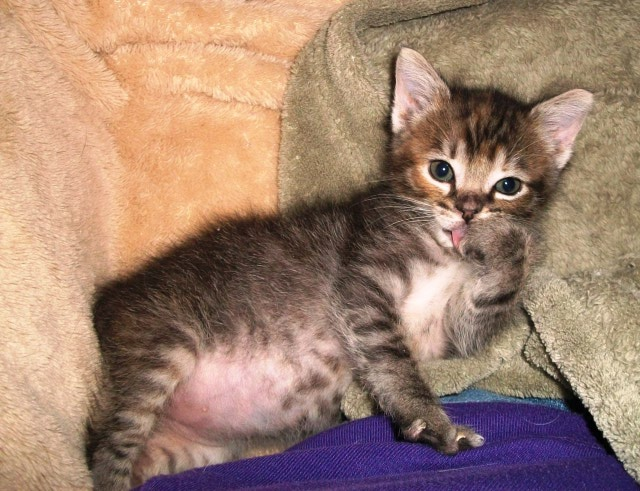 sick kitten
QuestionQUESTION: I have a 1 month old foster kitten th
sick kitten
QuestionQUESTION: I have a 1 month old foster kitten th
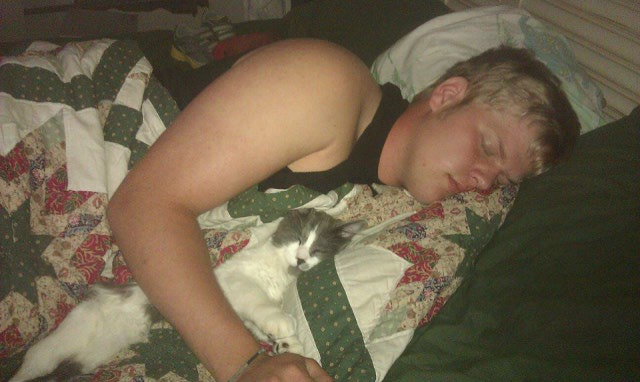 Sick kitty
Question
Kelso
Hi, I rescued a feral cat who was
Sick kitty
Question
Kelso
Hi, I rescued a feral cat who was
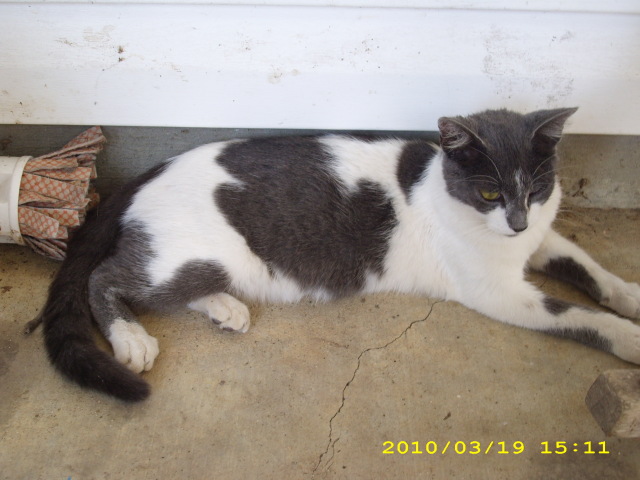 My cat, Spots
QuestionQUESTION: Hi. My cat Spots is a wonderful cat.
My cat, Spots
QuestionQUESTION: Hi. My cat Spots is a wonderful cat.
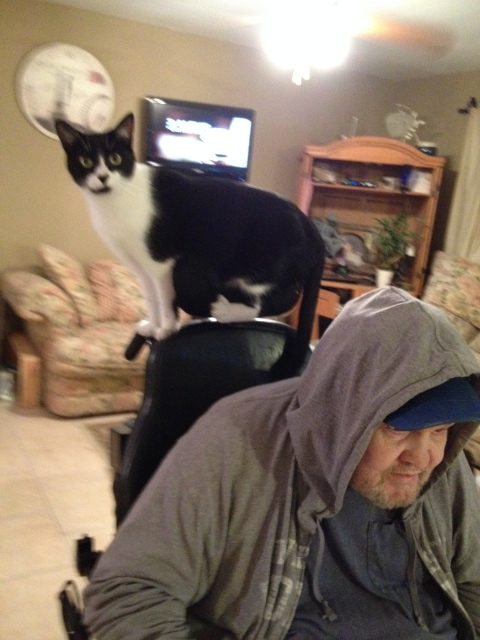 testosterone replacement for neutered male cat
Question
Monkey riding on dads Monkey sleeping h
testosterone replacement for neutered male cat
Question
Monkey riding on dads Monkey sleeping h
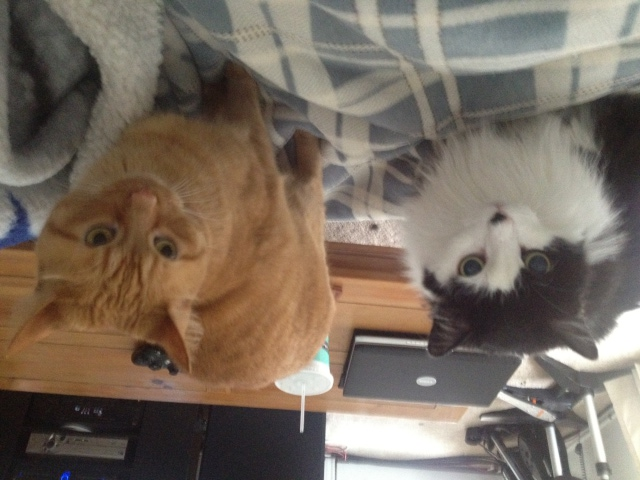 Cat peeing on floor after other cat died
Question
My babies
I have a 6 year old tabby (my
Cat peeing on floor after other cat died
Question
My babies
I have a 6 year old tabby (my